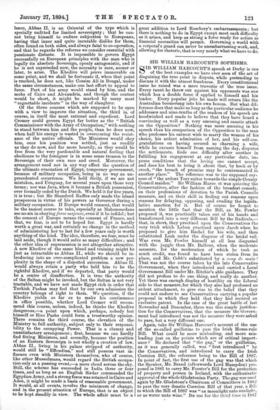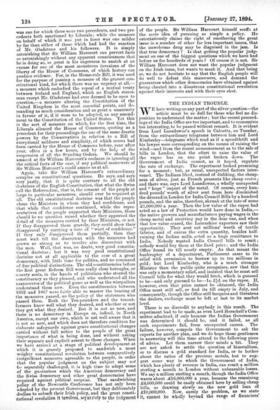SIR WILLIAM HARCOURT'S SOPHISMS.
SLR WILTJAM HARCOURT'S speech at Derby is one of the best examples we have ever seen of the art of disguising the true point in dispute, while pretending to discuss it with the utmost frankness. Every constitutional issue he raised was a mere travestie of the true issue. Every taunt he threw out against his opponents was one which has a double force if applied to himself and his leader. Every popular joke he made will return like the Australian boomerang into his own bosom. But what dif- ference does that make so long as the particular audience he addresses and nine-tenths of the readers of his speech are hoodwinked and made to believe that they have heard a convincing as well as a very amusing and caustic attack on the Opposition? Nothing was more amusing in his speech than his comparison of the Opposition to the man who professes his earnest wish to marry the woman of his choice, his ardent admiration of her, and his self-con- gratulations on having secured so charming a wife, while he excuses himself from naming the day, disputes the settlements, finds one difficulty after another in fulfilling his engagement at any particular date, im- poses conditions that the loving one cannot accept, and does his best to bring it about that, by hook or by crook, " the breach of promise may be consummated in another place." The reference was to the supposed coy- ness of " the ardent Tory suitor towards the simple County Council maiden." Sir William Harco..rt was quizzing the Conservatives, after the fashion of the broadest comedy, on their professions of devotion to the Parish Councils measure, and on their skill in finding out reasons upon reasons for delaying, opposing, and evading the legisla- lative sanction for it. But of course he forgot to mention the little fact that the Bill, as Mr. Fowler proposed it, was practically taken out of his hands and transformed into a very different Bill by the Radicals,— that, in short, they practised upon the Conservatives the very trick which Laban practised upon Jacob when he proposed to give him Rachel for his wife, and then substituted Leah under the disguise of the bridal veil. Was even Mr. Fowler himself at all less disgusted with the juggle than Mr. Balfour, when the moderate measure, for the moderation of which he took so much credit, was found to have been stolen from its place, and Mr. Cobb's substituted by a coup de main? That was not the course taken by the late Conservative Government, when they introduced and carried a Local Government Bill under Mr. Ritchie's able guidance. They did not profess to do one thing, and really do another. Yet there was enough display of hostility on the Liberal side to that measure, for which they also had professed an ardent attachment, to give rise to the belief that they could not endure to see Conservatives carrying a popular proposal in which they held that they had secured an exclusive patent. In the case of the great battle of last November and December, there was this simple justifica- tion for the Conservatives, that the measure the Govern- ment had introduced was not the measure they were asked to pass, but a very different one. Again, take Sir William Harcourt's account of the use of the so-called guillotine to pass the Irish Home-rule Bill. What could be more misleading, and more mis- leading just on the points which are of critical import- ance ? He declared that "the gag," or the guillotine, as it was generally called, was " first introduced " by the Conservatives, and introduced to carry the Irish Coercion Bill, the reference being to the Bill of 1887. In point of fact, the first use of the gag was that which the Speaker, Mr. Brand (afterwards Lord Hampden) pro- posed in 1881 to carry Mr. Forster's Bill for the protection of property and person in Ireland, with the enthusiastic approval of the whole Gladstonian Party. The gag was used again by Mr. Gladstone's Chairman of Committees in 1882 to pass the very drastic Coercion Bill of that year, a Bill to which the Bill of 1887 was " as moonlight unto sunlight, or as water unto wine." Its use for the third time in 1887 was one for which there were two precedents, and two pre- cedents both sanctioned by Liberals ; while the measure on behalf of which it was put in force was one milder by far than either of those which had had the sanction of Mr. Gladstone and his followers. It is simply astonishing that Sir William Harcourt can pervert facts so astonishingly without any apparent consciousness that he is doing so, so great is his eagerness to snatch at an excuse for one of the most monstrous invasions of the liberty of the House of Commons, of which history can produce evidence. For, in the Home-rule Bill, it was used for the purpose of passing a measure of the gravest con- stitutional kind, for which there was no urgency at all,— a measure which embodied the repeal of a mutual treaty between Ireland and England, which no English states- man except Mr. Gladstone had ever deemed to be open to question,—a measure altering the Constitution of the United Kingdom in the most essential points, and de- manding as much consideration and as great a unanimity in favour of it, if it were to be adopted, as any amend- ment to the Constitution of the United States. Yet this is the sort of measure on which, for the first time, the Liberals silenced the House of Commons, quoting as a precedent for their proceedings the use of the same drastic powers by the Conservatives in relation to a Bill of exceptional mildness and simplicity, of which scores had -been carried by the House of Commons before, year after -year, often in a few hours, and by the help of the suspension of all the Standing Orders. We should be amazed at Sir William Harcourt's coolness in ignoring all -the critical facts of the case, if any political manoeuvre of Sir William Harcourt's could amaze us at all.
Again, take Sir William Harcourt's extraordinary scruples on constitutional questions. He says, and says very justly, that it is quite contrary to all the old doctrines of the English Constitution, that what the Swiss -call the Referendum, that is, the consent of the people at -large to particular measures, should ever be required at -all. The old constitutional doctrine was that the people chose the Ministers in whom they had confidence, and -that while that confidence continued, while the repre- sentatives of the people supported their Ministers, there should be no question raised whether they approved the detail of the measures carried by their Ministers, or not. 'if they disapproved them gravely, they could show their disapproval by carrying a vote of "want of confidence." If they only disapproved them partially, then they must wait till the discontent with the measures had -grown so strong as to involve also discontent with the men. Well, that was, no doubt, very good constitu- tional doctrine ; but it was very good constitutional doctrine not at all applicable to the case of a great democracy, with little time for politics, and no command of fine political distinctions. The old constituencies before the first great Reform Bill were really close boroughs, or -county seats, in the hands of politicians who steered the constituency as they pleased, and who understood all the manoeuvres of the political game as well as the wirepullers understand them now. Even the constituencies between 1832 and 1867 were fairly able to master the bearing of the measures passed, on the policy of the statesmen who passed them. Both the Ten-pounders and the tenant- farmers knew well what they desired, and whether or not they got what they desired. But it is not so now, and there is no democracy in Europe or, indeed, in North America, except our own, which is not well aware that it is not so now, and which does not therefore condition for elaborate safeguards against grave constitutional changes -carried without full notice to the people of the great importance of what is being done, and without asking their separate and explicit assent to those changes. When we have arrived at a stage of political development at which it is gravely proposed to sandwich a most weighty constitutional revolution between comparatively -insignificant measures agreeable to the people, in order that the popular judgment on the subject may not Be separately challenged, it is high time to adopt some -of the guarantees which the American democracy and -the Swiss democracy and other great democracies have required against political surprise. That sandwiching policy of the Newcastle Conference has not only been adopted by the present Government, but they deliberately -decline to submit their Irish policy, and the great consti- tutional revolution it involves, serantrely to the judgment
•
of the people. Sir William Harcourt himself scoffs at the mere idea of pursuing so simple a policy. He ostentatiously claims the right of smothering the great issue in a number of other far less important issues, that the unwelcome drug may be disguised in the jam. Is that true democracy ? Is that getting the popular judg- ment on one of the biggest questions which we have had before us for hundreds of years ? Of course it is not. Sir William Harcourt does not want the popular judgment on the Irish issue, but wants to mask it. And that being so, we do not hesitate to say that the English people will do well to defeat this manoeuvre, and demand the guarantees which other democracies have obtained against being cheated into a disastrous constitutional revolution against their interests and with their eyes shut.



















































 Previous page
Previous page